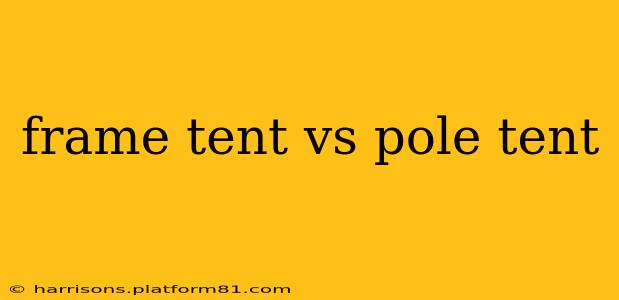Choosing between a frame tent and a pole tent depends heavily on your priorities and intended use. Both offer shelter from the elements, but their designs, setup, and overall performance differ significantly. This comprehensive guide will delve into the key distinctions, helping you make an informed decision.
What is a Frame Tent?
Frame tents boast a robust, pre-assembled frame made of aluminum or steel poles. This frame provides the tent's structure, independent of the fabric. The fabric, typically made of durable canvas or polyester, is simply draped over this pre-existing framework. This design eliminates the need for separate poles to support the tent's structure.
Advantages of Frame Tents:
- Easy Setup: Generally quicker and simpler to erect than pole tents, often involving a straightforward unfolding and staking process.
- Increased Stability: The rigid frame provides superior stability in windy conditions.
- More Durable: The integrated frame offers better protection against strong winds and heavy rain.
- Versatile: Frame tents come in a wide variety of sizes and styles, from small camping tents to large event tents.
Disadvantages of Frame Tents:
- Heavier & Bulky: Frame tents are usually heavier and more cumbersome to transport compared to pole tents.
- Higher Cost: Generally more expensive than comparable-sized pole tents.
- Less Customizable: Modification options are typically more limited due to the pre-assembled frame.
What is a Pole Tent?
Pole tents, also known as A-frame tents or ridge tents, utilize poles to create a triangular or A-shaped structure. The tent fabric is draped over these poles, and the overall stability depends on the proper placement and securing of these poles.
Advantages of Pole Tents:
- Lightweight & Portable: Generally lighter and easier to transport than frame tents, making them ideal for backpacking or camping in remote locations.
- Affordable: Typically more budget-friendly than comparable frame tents.
- More Customizable: Offers greater flexibility for customization and modifications.
Disadvantages of Pole Tents:
- More Difficult Setup: Setting up a pole tent requires more skill and time compared to frame tents. Proper pole placement is critical for stability.
- Less Stable in Wind: They are generally less stable in windy conditions compared to frame tents.
- More Susceptible to Damage: The reliance on poles for structural integrity makes them potentially more prone to damage from strong winds or heavy rain.
What are the Key Differences Between Frame Tents and Pole Tents?
This section addresses common questions regarding the distinctions between these tent types:
What is the difference in setup time between a frame tent and a pole tent?
Frame tents usually have a significantly faster setup time. Pole tents, needing individual pole placement and securing, demand more time and effort.
Which tent type is more resistant to wind and heavy rain?
Frame tents provide superior wind and rain resistance due to their rigid, integrated frame. Pole tents, while often weather-resistant, are more vulnerable to strong winds and heavy downpours.
Which tent is better for backpacking or camping in remote locations?
Lightweight and portable pole tents are better suited for backpacking and remote camping trips where weight and portability are crucial.
Which tent type is better for large events or gatherings?
Large frame tents are typically preferred for large events due to their stability, ease of setup, and spacious interior.
Which tent is easier to transport and store?
Pole tents, generally being lighter and more compact when disassembled, are easier to transport and store.
Which type of tent is more affordable?
Pole tents are generally more budget-friendly than frame tents of comparable size.
Choosing the Right Tent for You
The ideal tent depends entirely on your specific needs and priorities. Consider these factors:
- Intended Use: Camping, backpacking, large events, etc.
- Budget: Pole tents generally offer better value, while frame tents often come with a higher price tag.
- Weather Conditions: Frame tents provide greater protection in harsh weather.
- Setup Time & Ease: Frame tents are quicker to set up.
- Portability: Pole tents are lighter and easier to transport.
By carefully considering these aspects, you can confidently choose the tent that best meets your requirements. Whether you opt for the convenience of a frame tent or the portability of a pole tent, a well-informed decision will ensure many years of enjoyable use.
